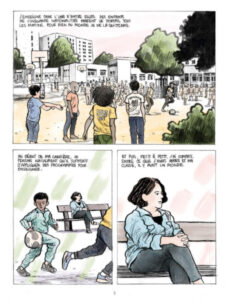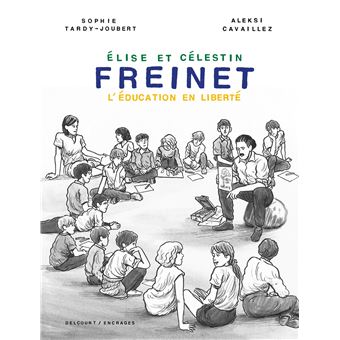Freinet's new pedagogy is regularly caricatured in the conservative media. To dismantle these preconceptions, what will you say to read a comic? Discover the life and ideas of the Freinet couple in L'éducation en liberté chez Delcourt.
The story of a passionate and a practitioner

Sophie Tardy-Joubert, screenwriter of L'éducation en liberté, is a teacher who works in the suburbs, in the middle of the towers, with students from four continents. She is happy. This happiness comes from the past, from the practices of Célestin Freinet. With L'éducation en liberté, she proposes a committed comic book that breaks out of stereotypes but also lamentations about school. In order to be as understandable as possible, the book takes us into the present of his success and then plunges us into the roots of Freinet's reflection by describing his life. To put these ideas into images, the cartoonist and colorist Aleksi Cavaillez proposes a deliberately human style. Refusing digital, he uses felt and colorist in pastel. He says a lot through the image: when he arrives at his new establishment, Augustin Freinet drops his books. The reader then sees that he is already interested in a different pedagogy.
Education in freedom is organized as a hagiography. The book begins with an oral testimony. The effectiveness of the method is proven by miraculous pedagogical acts. In the past, Freinet was initially a naïve believer in an ideal. He is so charismatic that faithful join him when he founds his community in a secluded space. He then goes looking for converts. Indeed, Célestin Freinet is presented as a monk of education. Wounded in the lung, he nevertheless devoted himself entirely to his class. He thinks only of his mission even though he is married and has a daughter. They live in their school. His wife Elise meets him through a pedagogical text and must ask him to clear a corridor to install a cradle. The lounge is used to ship magazines. The Freinets finance these activities from their income. Only a tender moment with his wife Elise gives a little flesh to this person.
Understanding Freinet's pedagogy

Education in Freedom is a pedagogical book that shows, by chapter, the construction of a method. The reflection begins with the arrival of a new teacher in Bar-sur-Loup in the South of France. This lost village is the first post of Freinet. From the beginning, the graduate teacher has convictions. He does not want to be obeyed by his students. On the contrary, he is interested in children. This communist militant wants to train free spirits who will refuse indoctrination and war. More than a theory, it is a series of inventions that makes it possible to develop this method. He begins by leaving the classroom space with an exit. Students use more vocabulary and understand by seeing.
Freinet was interested in other pedagogues. He went to Switzerland for the International Congress of the International League for New Education. This trip also serves to show the effervescence of the time by citing several innovators now unknown: Cousinet and group work. It does not copy others because the system does not allow everything. In turn, his thought inspires other teachers who come to observe. They form a network and exchange student newspapers. His aura extends beyond school. The writer Henri Barbusse asked him to write without his diary.
Facing it, there is a rigid society based on authority. The classroom is located in the city hall of a far-right mayor. Freinet's practices surprised and then shocked the priest and the police. The tone rises in the village. The rumour reaches the hemicycle of the Chamber of Deputies where the minister wants to stop the criticism in a radical way. This opposition galvanized Freinet and radicalized his ideas.
These elements show the importance of context. Freinet has made war and wants to change the world to avoid a return of the worst. Opposition to his ideas crystallized around his political commitment through the union of different anti-communist currents. Indeed, we are at the time of the formation of the USSR which worries the entire West.
This book devoted to Freinet's pedagogy is a melting pot of contradictions. Although we talk about pedagogy, Education in Freedom manages to say a lot while limiting the text. Sophie Tardy-Joubert presents a communist pedagogue through a hagiographic structure. She talks about the past by showing her burning topicality.
Find more books on childhood with Salamandre and We Live.




















